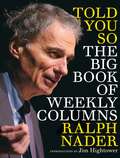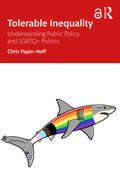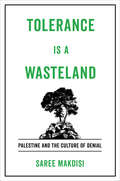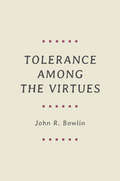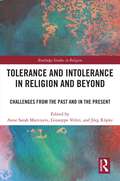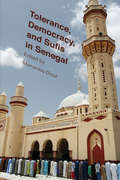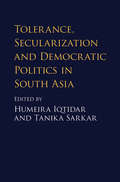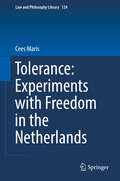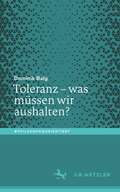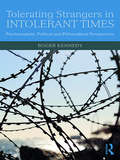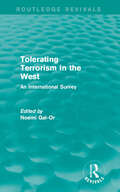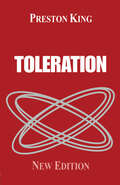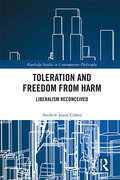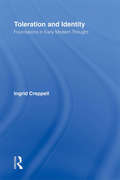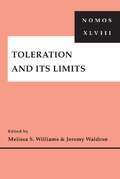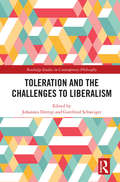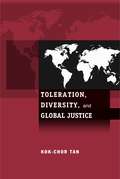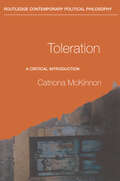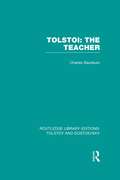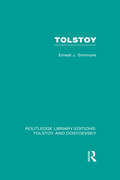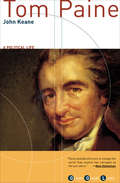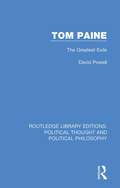- Table View
- List View
Told You So: The Big Book of Weekly Columns
by Jim Hightower Ralph Nader"What sets Ralph Nader apart is that he has moved beyond social criticism to effective political action."--The New York Times The column is the most natural literary form for a citizen's advocate, and Ralph Nader may be its most robust and forceful practitioner. The Big Book of Ralph Nader Columns presents a panoramic portrait of the problems confronting our society and provides examples of the many actions an organized citizenry could and should take to create a more just and environmentally sustainable world. Drawing on decades of experience, Nader's columns document the consequences of concentrated corporate power; threats to our food, water and air; the corrosive effect of commercialism on our children; the dismantling of worker rights; and the attacks on our civil rights and civil liberties. Nader also offers concrete suggestions to spark citizen action and achieve social change.
Tolerable Inequality: Understanding Public Policy and LGBTQ+ Politics
by Chris Pepin-NeffPepin-Neff coins the term ‘Tolerable Inequality’ to examine the ways in which politicians and political actors use the policy process as a tool to make inequality acceptable as a way of keeping power and avoiding penalties.Power is built on the illusion of differences. The public policy process is used to reinforce the illusions of inferiority and superiority that help to keep power in the hands of the powerful. Tolerable Inequality reinforces these differences by diverting attention away from issues that would give marginalized people power, reducing differences between public expectations and reality, and policy reactions that fortify existing social status. The three tactics of Tolerable Inequality include: focused inattention and inaction, deviation harmonization of differences between expectations and perceived reality, and equality governance, where equality is distributed in the policy process relative to conditional compliance and comparative identity. The book explores this concept within the context of LGBTQ+ policy and presents a framework that allows the public to engage in the policy process in ways that highlight the role of expected political penalties in order to reclaim policymaking in the public interest.A comprehensive text for researchers and students in LGBTQ studies, American Studies, Policy Studies, and Legislative Studies.
Tolerance Is a Wasteland: Palestine and the Culture of Denial
by Saree MakdisiHow denial sustains the liberal imagination of a progressive and democratic Israel. The question that this book aims to answer might seem simple: how can a violent project of dispossession and discrimination be imagined, felt, and profoundly believed in as though it were the exact opposite––an embodiment of sustainability, multicultural tolerance, and democratic idealism? Despite well-documented evidence of racism and human rights abuse, Israel has long been embraced by the most liberal sectors of European and American society as a manifestation of the progressive values of tolerance, plurality, inclusivity, and democracy, and hence a project that can be passionately defended for its lofty ideals. Tolerance Is a Wasteland argues that the key to this miraculous act of political alchemy is a very specific form of denial. Here the Palestinian presence in, and claim to, Palestine is not simply refused or covered up, but negated in such a way that the act of denial is itself denied. The effects of destruction and repression are reframed, inverted into affirmations of liberal virtues that can be passionately championed. In Tolerance Is a Wasteland, Saree Makdisi explores many such acts of affirmation and denial in a range of venues: from the haunted landscape of thickly planted forests covering the ruins of Palestinian villages forcibly depopulated in 1948; to the theater of "pinkwashing" as Israel presents itself to the world as a gay-friendly haven of cultural inclusion; to the so-called Museum of Tolerance being built on top of the ruins of a Muslim cemetery in Jerusalem, which was methodically desecrated in order to clear the space for this monument to "human dignity." Tolerance Is a Wasteland reveals the system of emotional investments and curated perceptions that makes this massive project of cognitive dissonance possible.
Tolerance among the Virtues
by John R. BowlinIn a pluralistic society such as ours, tolerance is a virtue--but it doesn't always seem so. Some suspect that it entangles us in unacceptable moral compromises and inequalities of power, while others dismiss it as mere political correctness or doubt that it can safeguard the moral and political relationships we value. Tolerance among the Virtues provides a vigorous defense of tolerance against its many critics and shows why the virtue of tolerance involves exercising judgment across a variety of different circumstances and relationships--not simply applying a prescribed set of rules.Drawing inspiration from St. Paul, Aquinas, and Wittgenstein, John Bowlin offers a nuanced inquiry into tolerance as a virtue. He explains why the advocates and debunkers of toleration have reached an impasse, and he suggests a new way forward by distinguishing the virtue of tolerance from its false look-alikes, and from its sibling, forbearance. Some acts of toleration are right and good, while others amount to indifference, complicity, or condescension. Some persons are able to draw these distinctions well and to act in accord with their better judgment. When we praise them as tolerant, we are commending them as virtuous. Bowlin explores what that commendation means.Tolerance among the Virtues offers invaluable insights into how to live amid differences we cannot endorse--beliefs we consider false, actions we think are unjust, institutional arrangements we consider cruel or corrupt, and persons who embody what we oppose.
Tolerance and Intolerance in Religion and Beyond: Challenges from the Past and in the Present (Routledge Studies in Religion)
by Jörg Rüpke Giuseppe Veltri Anne Sarah MatviyetsThis book focuses on religious tolerance and intolerance in terms of practices, institutions, and intellectual habits. It brings together an array of historical and anthropological studies and philosophical, cognitive, and psychological explorations by established scholars from a range of disciplines. The contributions feature modern and historic instances of tolerance and intolerance across a variety of geographies, societies, and religious traditions. They help readers to gain an understanding of the notion of tolerance and the historical consequences of intolerance from the perspective of different cultures, religions, and philosophies. The volume highlights tolerance’s potential to be a means to build bridges and at the same time determine limits. Whilst the challenge of promoting tolerance has mostly been treated as a value or practice of demographic or religious majorities, this book offers a broader take and pays attention to minority perspectives. It is a valuable reference for scholars of religious studies, the sociology of religion, and the history of religion.
Tolerance and Risk: How U.S. Liberalism Racializes Muslims (Muslim International)
by Mitra RastegarHow apparently positive representations of Muslims in U.S. media cast Muslims as a racial population Portrayals of Muslims as the beneficiaries of liberal values have contributed to the racialization of Muslims as a risky population since the September 11 attacks. These discourses, which hold up some Muslims as worthy of tolerance or sympathy, reinforce an unstable good Muslim/bad Muslim binary where any Muslim might be moved from one side to the other. In Tolerance and Risk, Mitra Rastegar explores these discourses as a component of the racialization of Muslims—where Muslims are portrayed as a highly diverse population that nevertheless is seen to contain within it a threat that requires constant vigilance.Tolerance and Risk brings together several case studies to examine the interrelation of representations of Muslims abroad and in the United States. These include human-interest stories and opinion polls of Muslim Americans, media representations of education activist Malala Yousafzai, LGBTQ activist discourses, local New York controversies surrounding Muslim-led public projects, and social media discourses of the Syrian refugee crisis. Tolerance and Risk demonstrates how representations of tolerable or sympathetic Muslims produce them as a population with distinct characteristics, capacities, and risks, and circulate standards by which the trustworthiness or threat of individual Muslims must be assessed.Tolerance and Risk examines the ways that discourses of liberal rights, including feminist and LGBTQ rights discourses, are mobilized to racialize Muslims as uncivilized, even as they garner sympathy and identification with some Muslims.
Tolerance, Democracy, and Sufis in Senegal (Religion, Culture, and Public Life #15)
by Mamadou DioufThis collection critically examines "tolerance," "secularism," and respect for religious "diversity" within a social and political system dominated by Sufi brotherhoods. Through a detailed analysis of Senegal's political economy, essays trace the genealogy and dynamic exchange among these concepts while investigating public spaces and political processes and their reciprocal engagement with the state, Sunni reformist and radical groups, and non-religious organizations. The anthology provides a rich and nuanced historical ethnography of the formation of Senegalese democracy, illuminating the complex trajectory of the Senegalese state and reflecting on similar postcolonial societies. Offering rare perspectives on the country's "successes" since liberation, the volume identifies the role of religion, gender, culture, ethnicity, globalization, politics, and migration in the reconfiguration of the state and society, and it makes an important contribution to democratization theory, Islamic studies, and African studies.
Tolerance, Secularization and Democratic Politics in South Asia
by Humeira Iqtidar Tanika SarkarWhat is the relationship between secularization and tolerance? Critically analyzing the empirical and theoretical foundations of a putatively linear relationship between the two, this volume argues for moving past both romanticised readings of pre-modern tolerance and the unthinking belief that secularization will inevitably lead to tolerance. The essays collected in this volume include contributions from across South Asia that suggest that democratic politics have added a layer of complexity to questions of peaceful co-existence. Modern transformations in religious thought and practice have had contradictory implications for tolerance, which offer rich insights into contemporary debates in the region. This multi-disciplinary volume, which spans history, sociology, anthropology and political theory, questions the uncritical acceptance of tolerance as the best framework for engaging with difference, and probes the complications created by and through democratic politics.
Tolerance: Experiments with Freedom in the Netherlands (Law and Philosophy Library #124)
by Cees MarisThis book presents a collection of philosophical essays on freedom and tolerance in the Netherlands. It explores liberal freedom and its limits in areas such as freedom of speech, public reason, sexual morality, euthanasia, drugs policy, and minority rights. The book takes Dutch practices as exemplary test cases for the principled discussions on these subjects from the perspective of political liberalism. Indeed, the Netherlands may be viewed as a social laboratory in human tolerance. During the Cultural Revolution of the 1960s, Holland took the lead in a global emancipation process towards a society based on equal freedom. It was the first country to legalize euthanasia, soft drugs and gay marriage. In the final sections, the book examines the question of whether the political murders on the politician Pim Fortuyn and the film director Theo van Gogh, the reactions to Ayaan Hirsi Ali’s film Submission, as well as the success of the populist politician Geert Wilders are signs of the end of Dutch tolerance. Although it recognizes that the political climate has taken a conservative turn, the book shows that the Netherlands still shows remarkable tolerance.
Toleranz – was müssen wir aushalten? (#philosophieorientiert)
by Dominik BalgToleranz – eine Haltung, die in westlichen Gesellschaften wie kaum eine andere mit Nachdruck gefordert und mit Vehemenz verteidigt wird. Insbesondere eine tolerante Haltung gegenüber fremden Ansichten, Standpunkten und Überzeugungen wird von vielen als unverzichtbare Bedingung für das Gelingen eines demokratischen Miteinanders angesehen. Gleichzeitig wird kontrovers diskutiert, wo eigentlich die Grenzen einer toleranten Pluralität verschiedener Meinungen gezogen werden sollen. Welche Ansichten sind noch tolerabel, und welche nicht? Mit Blick auf aktuelle gesellschaftliche Diskurse und vor dem Hintergrund umfassender Kenntnisse der philosophischen Toleranzforschung überprüft Dominik Balg kontrovers diskutierte Minderheitenpositionen auf ihre Tolerierbarkeit und entwickelt vor diesem Hintergrund einen klaren Kriterienkatalog, mit Hilfe dessen sich die Grenzen einer toleranten Haltung sinnvoll ziehen lassen. Darüber hinaus widmet er sich der Frage, was eigentlich jenseits unserer Toleranzgrenzen liegen sollte und wie man verantwortungsvoll mit Positionen umgehen kann, die nicht mehr tolerabel sind.
Tolerating Strangers in Intolerant Times: Psychoanalytic, Political and Philosophical Perspectives
by Roger KennedyIn this interdisciplinary and wide-ranging study, Roger Kennedy looks at the roots of tolerance and intolerance as well as the role of the stranger and strangeness in provoking basic fears about our identity. He argues that a fear of a loss of attachment to one’s home might account for many prejudiced and intolerant attitudes to refugees and migrants; that basic fears about being displaced by so-called ‘strangers’ from our precious and precarious sense of a psychic home can tear communities apart, as well as lead to discrimination against those who appear to be different. Present day intolerance includes fears about the ‘hordes’ of immigrants confused with realistic fears about terrorist attacks, populist fears about loss of cultural integrity and with it a sense of powerlessness, and fearful debates about such basics as truth, including the so-called ‘post truth’ issue. Such fears, as explored in the book, mirror old arguments going back centuries to the early enlightenment thinkers and even before, when the parameters of discussion about tolerance were mainly around religious tolerance. There is urgency about addressing these kinds of issue once more at a time when the ‘ground rules’ of what makes for a civilized society seem to be under threat. Kennedy argues that society needs a ‘tolerance process’, in which critical thinking and respectful judgment can take place in an atmosphere of debate and reasonably open communication, when issues around what can and cannot be tolerated about different beliefs, practices and attitudes in people in our own and other cultures, are examined and debated. Tolerating Strangers in Intolerant Times, with the help of psychoanalytic, literary, social and political thinking, looks at what such a tolerance process could look like in a world increasingly prone to intolerance and prejudice. It will appeal to psychoanalysts as well as scholars of politics and philosophy.
Tolerating Terrorism in the West: An International Survey (Routledge Revivals)
by Noemi Gal-OrHas terrorism lost the power to shock and appal? Have liberal democracies learned to tolerate terrorism? Using case studies of governments’ and societies’ responses to terrorism, this book, first published in 1991, shows how attitudes towards terrorism have developed. Five western countries with differing political structures and histories are studied: Belgium, the Federal Republic of Germany, Israel, Italy and Spain. The analysis investigates the roles of social, political, legal, professional and religious institutions and movements in formulating the approved attitude towards terrorism that governs political bodies as well as society at large. This book will be of interest to students of politics and sociology.
Toleration
by Preston King Professor Preston KingWhy should we be tolerant? What does it mean to ‘live and let live’? What ought to be tolerated and what not? Up-and-coming author, Catriona McKinnon presents a comprehensive, yet accessible introduction to toleration in her new book. Divided into two parts, the first clearly introduces and assesses the major theoretical accounts of toleration, examining it in light of challenges from scepticism, value pluralism and reasonableness. The second part applies the theories of toleration to contemporary debates such as female circumcision, French Headscarves, artistic freedom, pornography and censorship, and holocaust denial. Drawing on the work of philosophers, such as Locke, Mill and Rawls, whose theories are central to toleration, the book provides a solid theoretical base to those who value toleration, whilst considering the challenges toleration faces in practice. It is the ideal starting point for those coming to the topic for the first time, as well as anyone interested in the challenges facing toleration today.
Toleration and Freedom from Harm: Liberalism Reconceived (Routledge Studies in Contemporary Philosophy)
by Andrew Jason CohenToleration matters to us all. It contributes both to individuals leading good lives and to societies that are simultaneously efficient and just. There are personal and social matters that would be improved by taking toleration to be a fundamental value. This book develops and defends a full account of toleration—what it is, why and when it matters, and how it should be manifested in a just society. Cohen defends a normative principle of toleration grounded in a new conception of freedom as freedom from harm. He goes on to argue that the moral limits of toleration have been reached only when freedom from harm is impinged. These arguments provide support for extensive toleration of a wide range of individual, familial, religious, cultural, and market activities. Toleration Matters will be of interest to political philosophers and theorists, legal scholars, and those interested in matters of social justice.
Toleration and Identity: Foundations in Early Modern Thought
by Ingrid CreppellRecently, there has been a notable rise in interest in the idea of "toleration", a rise that Ingrid Creppell argues comes more from distressing political developments than positive ones, and almost all of them are related to issues of identity: rampant genocide in the 20th Century, the resurgence of religious fundamentalism around the world; and ethnic-religious wars in Eastern Europe and the Middle East. In Toleration and Identity, Creppell argues that a contemporary ethic of toleration must include recognition of identity issues, and that the traditional liberal ideal of toleration is not sufficiently understood if we define it strictly as one of individual rights and freedom beliefs. Moving back and forth between contemporary debates and the foundational writings of Bodin, Montaigne, Lock, and Defoe, Toleration and Identity provides a fresh perspective on two key ideas deeply connected to current philosophical debates and political issues.
Toleration and Its Limits: NOMOS XLVIII (NOMOS - American Society for Political and Legal Philosophy #33)
by Jeremy Waldron Melissa S. WilliamsToleration has a rich tradition in Western political philosophy. It is, after all, one of the defining topics of political philosophy—historically pivotal in the development of modern liberalism, prominent in the writings of such canonical figures as John Locke and John Stuart Mill, and central to our understanding of the idea of a society in which individuals have the right to live their own lives by their own values, left alone by the state so long as they respect the similar interests of others. Toleration and Its Limits, the latest addition to the NOMOS series, explores the philosophical nuances of the concept of toleration and its scope in contemporary liberal democratic societies. Editors Melissa S. Williams and Jeremy Waldron carefully compiled essays that address the tradition’s key historical figures; its role in the development and evolution of Western political theory; its relation to morality, liberalism, and identity; and its limits and dangers. Contributors: Lawrence A. Alexander, Kathryn Abrams, Wendy Brown, Ingrid Creppell, Noah Feldman, Rainer Forst, David Heyd, Glyn Morgan, Glen Newey, Michael A. Rosenthal, Andrew Sabl, Steven D. Smith, and Alex Tuckness.
Toleration and the Challenges to Liberalism (Routledge Studies in Contemporary Philosophy)
by Johannes Drerup Gottfried SchweigerThis book explores the relationship between different versions of liberalism and toleration by focusing on their shared theoretical and political challenges. Toleration is among the most pivotal and the most contested liberal values and virtues. Debates about the conceptual scope, justification, and political role of toleration are closely aligned with historical and contemporary philosophical controversies on the foundations of liberalism. The essays in this volume focus on the specific connection between toleration and liberalism. The essays in Part I reconstruct some of the major historical controversies surrounding toleration and liberalism. Part II centers on general conceptual and justificatory questions concerning toleration as a central category for the definition of liberal political theory. Part III is devoted to the theoretical analysis of applied issues and cases of conflicts of toleration in liberal states and societies. Toleration and the Challenges to Liberalism will be of interest to researchers and advanced students in social and political philosophy, ethics, and political theory.
Toleration in Political Conflict
by Glen NeweyPolitical disputes over toleration are endemic, while toleration as a political value seems opposed to those of civic equality, neutrality and sometimes democracy. Toleration in Political Conflict sets out to understand toleration as both politically awkward and indispensable. The book exposes the incoherence of Rawlsian reasonable pluralist justifications of toleration, and shows that toleration cannot be fully reconciled with liberal political values. While raison d'tat concerns very often overshadow debates over toleration, these debates – for example about terrorism – need not be framed as a conflict between toleration and security. Framing them in this way tends to obscure objectionable behaviour by tolerators themselves, and their reliance on asymmetric power. Glen Newey concludes by sketching a picture of politics as dependent on free speech which, he argues, is entailed by the demands of free association. That in turn suggests that questions of toleration are inescapable within the conditions of politics itself.
Toleration, Diversity, and Global Justice (G - Reference, Information and Interdisciplinary Subjects)
by Kok-Chor TanThe "comprehensive liberalism" defended in this book offers an alternative to the narrower "political liberalism" associated with the writings of John Rawls. By arguing against making tolerance as fundamental a value as individual autonomy, and extending the reach of liberalism to global society, it opens the way for dealing more adequately with problems of human rights and economic inequality in a world of cultural pluralism.
Toleration: A Critical Introduction (Routledge Contemporary Political Philosophy)
by Catriona McKinnonWhy should we be tolerant? What does it mean to ‘live and let live’? What ought to be tolerated and what not? Catriona McKinnon presents a comprehensive, yet accessible introduction to toleration in her new book. Divided into two parts, the first clearly introduces and assesses the major theoretical accounts of toleration, examining it in light of challenges from scepticism, value pluralism and reasonableness. The second part applies the theories of toleration to contemporary debates such as female circumcision, French Headscarves, artistic freedom, pornography and censorship, and holocaust denial. Drawing on the work of philosophers, such as Locke, Mill and Rawls, whose theories are central to toleration, the book provides a solid theoretical base to those who value toleration, whilst considering the challenges toleration faces in practice. It is the ideal starting point for those coming to the topic for the first time, as well as anyone interested in the challenges facing toleration today.
Tolstoi: The Teacher (Routledge Library Editions: Tolstoy and Dostoevsky)
by Charles-BaudouinThe author states here that Tolstoy was a great educator and his views on education were ingenious and profound. Despite being a great artist, Tolstoy also had pedagogic method and drew abundantly on the stores of science. The book looks at articles which Tolstoy wrote on education and childhood, comparing him frequently to Rousseau, and also outlines the influences of his travels which informed his knowledge of contemporary schooling. The conclusion considers the development of Tolstoy’s thought on teaching alongside the state of education at the time the book was first published, in 1923. This will be of interest for the educational historian as well as those interested in Tolstoy himself.
Tolstoy (Routledge Library Editions: Tolstoy and Dostoevsky)
by Ernest Joseph SimmonsTolstoy’s fame as one of the world’s greatest novelists has never been in doubt, but the importance of his views on the social, moral and religious issues of his time is not so widely recognised. This study, first published in 1973, presents an introduction to the historical and cultural background of Tolstoy’s lifetime, then going on to consider the major events of his developing personality as a writer and reformer. As well as considering the famous novels and literary criticism, Simmons treats his educational theories and practice, famine relief work, spiritual crises and religious, social and moral beliefs, as reflected in controversial writings such as What I Believe, What Then Must We Do? and The Kingdom of God Is Within You. He also investigates Tolstoy’s involvement in government, war and revolution, and the relevance of his reformist views in the contemporary world.
Tom Clancy - Three Complete Novels: Patriot Games; Clear And Present Danger; The Sum Of All Fears
by Tom ClancyOver the course of his novels, Tom Clancy's "genius for big, compelling plots" and his "natural narrative gift" (The New York Times Magazine) have mesmerized tens of millions of readers—more than 42 million of his books are in print in the United States alone—and established him as one of the preeminent storytellers of our time. Here, complete and unabridged, are three of his best: heart-stopping classics of action, suspense, and the exceptional realism that is his hallmark. PATRIOT GAMES: When Jack Ryan breaks up a terrorist attack in London, he has no idea that he has just saved the lives of the Prince and Princess of Wales. However, he has also gained the enmity of the Ulster Liberation Army, an ultra-left-wing splinter group of the IRA—and soon it is Ryan himself who is their target. CLEAR AND PRESENT DANGER: Colombian drug lords assassinate three high American officials, and the United States decides to take the fight to the enemy. But does anyone know who the real enemy is, and which lines cannot be crossed? Jack Ryan and his field operative, Mr. Clark, must find out, little realizing that though there will be danger from without, the danger from within will be the greatest of all. THE SUM OF ALL FEARS: With one terrible act, the world is plunged into an instant nuclear crisis, and a floundering president into the ultimate nightmare. As nations stand on the brink of war, Ryan and his FBI counterpart frantically seek a solution before the chiefs of state lose control of themselves—and the world.
Tom Paine: A Political Life (Grove Great Lives Ser.)
by John Keane&“It is hard to imagine this magnificent biography ever being superseded . . . It is a stylish, splendidly erudite work.&” —Terry Eagleton, The Guardian &“More than any other public figure of the eighteenth century, Tom Paine strikes our times like a trumpet blast from a distant world.&” So begins John Keane&’s magnificent and award-winning (the Fraunces Tavern Book Award) biography of one of democracy&’s greatest champions. Among friends and enemies alike, Paine earned a reputation as a notorious pamphleteer, one of the greatest political figures of his day, and the author of three bestselling books, Common Sense, Rights of Man, and The Age of Reason. Setting his compelling narrative against a vivid social backdrop of prerevolutionary America and the French Revolution, John Keane melds together the public and the shadowy private sides of Paine&’s life in a remarkable piece of scholarship. This is the definitive biography of a man whose life and work profoundly shaped the modern age. &“[A] richly detailed . . . disciplined labor of scholarship and love, an exemplar of the rewards of a gargantuan effort at historical research. . . . In short, buy it; it&’s definitive.&” —Library Journal
Tom Paine: The Greatest Exile (Routledge Library Editions: Political Thought and Political Philosophy #47)
by David PowellFirst published in 1985. In the late autumn of 1774 at the age of 37 Tom Paine arrived in Philadelphia. Eighteen months later he had established himself as a seminal figure in the Independence movement. It was the start of a career in which he became the first US Secretary of State for Foreign Affairs; was outlawed from England by Pitt for the publication of the second part of the Rights of Man; delivered a final plea for the life of Louis XVI in the National Convention of 1794; was imprisoned in the Luxembourg, and sentenced to death by Robespierre. After a sad and lonely death in New Rochelle Cobbett brought back his bones to England: ‘to light a taper for liberty.’ Yet Paine remains a man without a past; a man who seemingly burst on the world scene as a full-blown radical at 37 years of age. No one had attempted to explore and interpret the critical, shaping influences of his early and middle life. Yet such background is crucial to explaining all the rest. Without a clear understanding of his Quaker inheritance; of his childhood years in Thetford; of his early philosophical and political apprenticeship in London; and of the six formative years he spent at Lewes, the later man and his radicalism are totally incomprehensible. Thus, the author’s objective is to place Paine in his times; to interpret the evolution of his political, social and theological ideas. Paine is little more than a cardboard cut-out moving through history in the majority of biographies that have already been published. This book sees the world through Paine’s own eyes and provides a human interpretation not only of ‘the Age of Revolution’ but also of ‘the maker of revolutions’ himself. To Napoleon, Paine was the man to whom: ‘a statue in gold should be erected in every town’; to Theodore Roosevelt he was ‘that filthy little atheist’; to Michael Foot: ‘the greatest exile that has ever left England’s shores.’ To understand the thinking of a man who can provoke such reactions, it is necessary to understand both the man and the times through which he lived. This title will be of great interest to students of history, politics, and philosophy.
